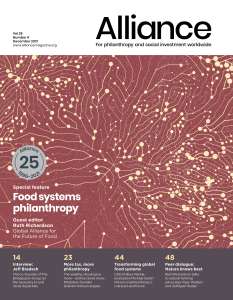In the last two years, we’ve seen that a global shock like a pandemic can have many unexpected and cascading impacts. Moreover, the pandemic didn’t occur in a vacuum. In addition to dealing with the fallout from COVID-19, we’ve struggled to respond to unrelated disasters, such as wildfires, deadly heatwaves, droughts, massive floods, and fuel shortages, all of which demonstrate a worldwide need for better resilience and preparedness.
We especially need to be prepared for abrupt and protracted shocks that affect continental and global food systems, also known as ‘Multiple Breadbasket Failures’ (MBBF). With more than 25 per cent of famine relief coming from North America, any MBBF in the United States and Canada will have an immediate and catastrophic effect in every continent.
In 1816, the world experienced ‘The Year Without a Summer’, after a volcanic eruption in Indonesia lofted so much soot and ash into the atmosphere that global temperatures dropped. This impacted agriculture and triggered an MBBF, which led to widespread famines. Between the likely disasters associated with rising temperatures and the expectation of less common events, such as large volcanic eruptions, countries around the world need to be better prepared to feed their people in the event of MBBFs.
We can’t prevent most global disasters, but we can be prepared to recover quickly. If we prepare now, then we’d be ready to save millions of lives when catastrophes occur. Actions taken today could prevent a global-scale famine.
But even with the possibility of saving millions of lives and preserving the global economy, this is a tricky area for governments, as they have many immediate priorities and preparedness can seem ‘unnecessary’ or ‘doomist’. This is where a nonprofit alliance of NGOs, academics, and industry can be helpful. The alliance can take on much of the preparation work governments are unable to tackle, and they can work with governments to ensure resilience plans are in place when a catastrophe occurs.
ALLFED, the Alliance to Feed the Earth in Disasters, is the nonprofit that makes this mission real.
The idea for ALLFED first began to form when Dr David Denkenberger read about a surge in mushrooms after the dinosaur extinction and thought ‘if the same thing happens to us, why not eat the mushrooms and not go extinct?’ Denkenberger teamed up with Dr Joshua Pearce to examine how we could feed eight billion people through a five-year volcanic winter when nothing could grow.
Their book, Feeding Everyone No Matter What, looks at how this can be done cheaply so that everyone can be saved. In fact, relying primarily on technologies that exist today, it’s even possible that a surplus could be produced, which would help save other species.
How can we do this?
In any catastrophic scenario, a key issue is: how quickly can we create and distribute food supplies? How can we repurpose today’s industry and technology to feed people during these global catastrophic risks? Research, education and training are absolutely necessary, as Alliance Magazine addressed in part in its recent article about ‘bending the arc of philanthropy’.
ALLFED is a consortium of researchers, philanthropists, futurists, and philosophers who aim to prepare our planet for potential global catastrophes. With the help of forward-thinkers and philanthropists, ALLFED can start these initiatives right now:
- Pilot the repurposing of a paper factory to produce carbohydrates in five months
- Adapt animal feed production to human food production in one month
- Revert biofuel production to human food production in one week
- Create response plans for city-regions, countries, and continents
- Convene multilateral seminars on replacement and resilient food production
- Spread the word
To find out more, or how you can be involved, contact David Denkenberger at david@allfed.info or Rick Holland at rick@allfed.info.
Let’s work together to ensure humanity’s survival.
Ariel Conn is the founder and president of Mag10 Consulting, which helps organisations, including ALLFED, communicate and advocate for science and technology.
 New issue: Food and philanthropy
New issue: Food and philanthropy
Philanthropy spends billions on areas that are implicitly connected to food systems such as environment, climate, health, nutrition, and development but food issues are seldom explicitly addressed in funding strategies. Did 2021 prove to be the year when all that changed? This issue explores the ways in which philanthropy can help translate commitments made at the UN Food Systems Summit and COP26 into action and sets out a critical role for philanthropy in the future of food. Guest edited by Ruth Richardson, Executive Director of the Global Alliance for the Future of Food.
Subscribe today to make sure not to miss it!






Comments (0)